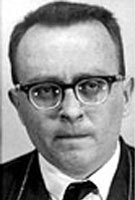Encyclopedia Dubuque
"Encyclopedia Dubuque is the online authority for all things Dubuque, written by the people who know the city best.”
Marshall Cohen—researcher and producer, CNN
Affiliated with the Local History Network of the State Historical Society of Iowa, and the Iowa Museum Association.
FEGUER, Victor Harry: Difference between revisions
No edit summary |
No edit summary |
||
| Line 6: | Line 6: | ||
Feguer was tried and convicted in federal court for these crimes. He was sentenced to death by hanging. Feguer submitted an appeal, which was denied. At that point, only President John F. Kennedy could have commuted the death sentence. Iowa's governor, Harold Hughes, a death penalty opponent[1], along with Feguer's attorney, contacted President John F. Kennedy to request clemency for Feguer. Kennedy thought that the crime was so brutal that he denied their request. He was hung for his crimes. | Feguer was tried and convicted in federal court for these crimes. He was sentenced to death by hanging. Feguer submitted an appeal, which was denied. At that point, only President John F. Kennedy could have commuted the death sentence. Iowa's governor, Harold Hughes, a death penalty opponent[1], along with Feguer's attorney, contacted President John F. Kennedy to request clemency for Feguer. Kennedy thought that the crime was so brutal that he denied their request. He was hung for his crimes. | ||
[[Category: Criminal]] | |||
Revision as of 21:36, 7 February 2010
FEGUER, Victor Harry. (1935--Fort Madison, IA, Mar. 15, 1963) Murderer. Victor Harry Feguer was the last person to be executed in America before it was banned as a sentence until 1976. He remains the last person to be put to death in Iowa after he was found guilty of killing Dr. Edward BARTELS.
Feguer, a drifter, arrived in Dubuque, Iowa, in the summer of 1960 and rented a room at a boarding house. Soon after arriving, he phoned Doctor Edward Bartels, claiming that a woman needed medical attention. When Dr. Bartels arrived, Feguer kidnapped him, drove him into Illinois, and killed the doctor with a single gunshot to the head. A few days later, Feguer was arrested in Montgomery, Alabama, after trying to sell Dr. Bartels' car. It is believed that Feguer had chosen Dr. Bartels, a 34 year old father of two, at random from the local Yellow Pages.
Authorities believe that Feguer had kidnapped and killed Dr. Bartels in order to gain access to any drugs that Bartels may have carried to treat patients. Because Feguer transported his hostage across state lines, federal charges were filed against Feguer. In his defense, Feguer claimed that a drug addict from Chicago, whom Feguer met in Dubuque, had actually murdered Bartels. Feguer claimed that he killed the drug addict and dumped his body in the MISSISSIPPI RIVER. Authorities could not find any evidence that this other person ever existed.
Feguer was tried and convicted in federal court for these crimes. He was sentenced to death by hanging. Feguer submitted an appeal, which was denied. At that point, only President John F. Kennedy could have commuted the death sentence. Iowa's governor, Harold Hughes, a death penalty opponent[1], along with Feguer's attorney, contacted President John F. Kennedy to request clemency for Feguer. Kennedy thought that the crime was so brutal that he denied their request. He was hung for his crimes.


